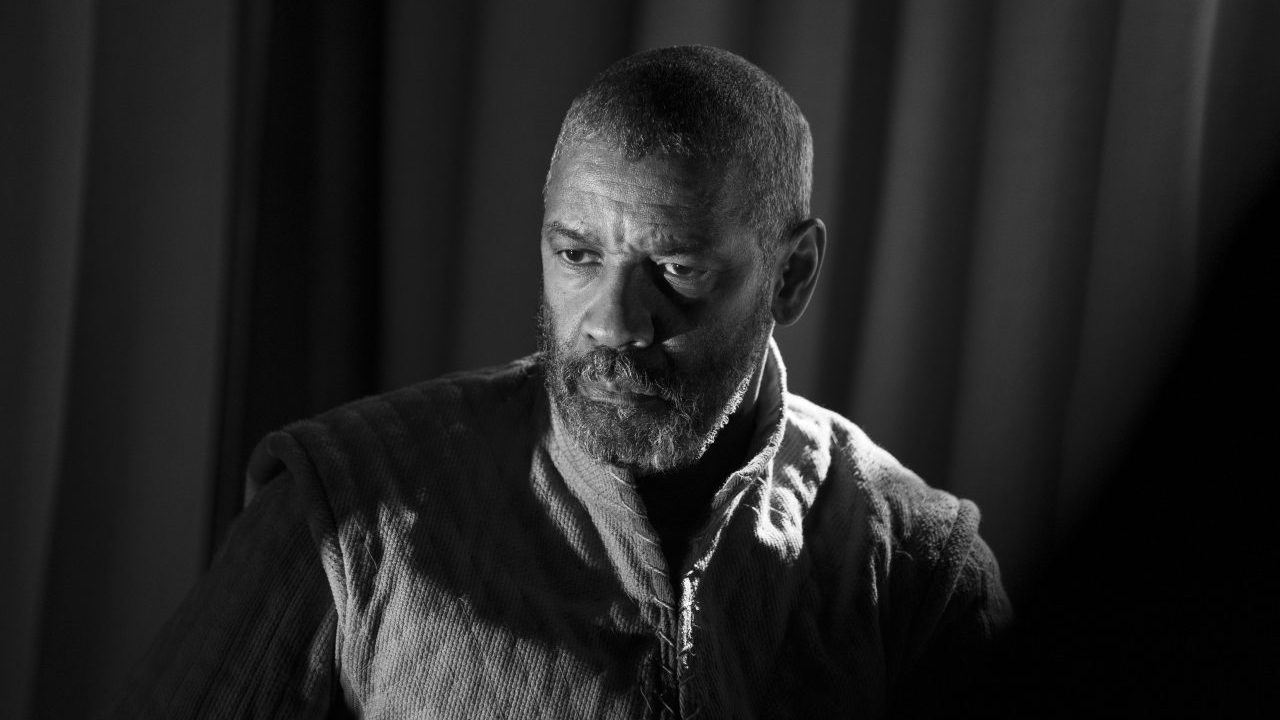

By the pricking of my thumbs, Joel Cohen’s The Tragedy of Macbeth this way comes! The acclaimed director’s stunning black and white adaptation of “the Scottish play” arrives on AppleTV+ today with knockout performances by Denzel Washington and Frances McDormand as the doomed lord and his scheming wife, and an impressionistic atmosphere, like a half-remembered dream.
Of course, this impressive film is just the latest in a long history of film versions of Shakespeare’s plays stretching all the way back to the dawn of movie making. The Bard is, after all, perennial. We never seem to tire of either the straight-forward adaptations or the looser takes inspired by his plays. But Shakespeare seems to be more present in the cultural imagination than usual recently. On a recent episode of The Ringer’s “Prestige TV Podcast,” Sean Fennessey suggested that might have something to do with the pandemic and all the sort of general sense in the popular imagination that Shakespeare wrote some of his most enduring work as the bubonic plague swept through England in the early 1600s.
Whatever the cause of Shakespeare’s latest moment, it’s undeniable that many of the best, most talked-about pop culture of the past year owes something to his plays. These six in particular seem especially relevant:
Macbeth
Obviously, we have to start with the triumphant The Tragedy of Macbeth. As noted above, Joel Cohen’s solo directorial debut (this is the first film he’s helmed without his brother Ethan) is a visceral experience. Washington and McDormand are tremendous, of course, but for me, any Macbeth lives and dies by its witches. This latest version features one hell of a creepy performance by British actor Kathryn Hunter as all three. Her smoke scarred voice and the way she twists her bony body to mimic the physicality of a vulture are truly haunting. By contrast, Justin Kurzel’s earthier 2015 adaptation of the play (streaming on HBO Max), downplays the trio somewhat. Still, the film is ravishing and brutal, and Michael Fassbender and Marion Cotillard are captivating as Macbeth and his lady. But if we’re talking witches, for my money, the weirdest, most memorable interpretation, for me at least, comes courtesy of the 2010 version starring Patrick Stewart that aired as part of PBS’s Great Performances (streaming on PBS Passport and available to rent on Amazon Prime). Polly Frame, Sophie Hunter and Niamh McGrady are deliriously unhinged, performing the witches’ famous incantations at break-neck, manic speed. It’s a terrifying hoot!
King Lear
If you’re a Succession fan, you owe it to yourself to see King Lear. The award-winning HBO drama borrows heavily from Shakespeare’s tragedy about an aged king struggling to handover his empire to his scheming children. Set in 21st Century London, director Richard Eyre’s 2018 version (streaming on Amazon Prime) has a particularly Succession kind of vibe, with the great Anthony Hopkins playing Lear and the powerhouse trifecta of Emma Thompson, Emily Watson and Florence Pugh burning up the screen as his icily stylish daughters.
Romeo and Juliet
You can’t do a list of Shakespeare films without including Romeo and Juliet. These star-crossed lovers never really go out of fashion, but they’re newly relevant thanks to Steven Spielberg’s recent adaptation of West Side Story, itself a riff on Romeo and Juliet set in 1950s Hell’s Kitchen. Franco Zeffirelli’s Oscar-winning 1968 version may be the gold standard, but for a certain generation, Baz Luhrmann’s wild Romeo + Juliet, with its music video editing and soundtrack and heartthrob stars and angel wings and Hawaiian shirts, is the essential version. You’ll get no argument from me there, but I am going to beat the drum for a smaller, slightly looser adaptation. Private Romeo (2011) retains much of the play’s original language, but queers it by setting the action in a contemporary all-male military academy. Fun fact: it also features and early performance by future Russian Doll star Charlie Barnett.
Hamlet
I imagine anyone who enjoyed HBO Max’s Station Eleven is probably a little Hamlet curious now. I say start with Kenneth Branagh’s sumptuous Oscar nominated 1996 version. Then check out the grimmer 1990 film directed by Franco Zeffirelli, but more for Glenn Close as Gertrude and the goddess Helena Bonham Carter as Ophelia. There’s also a slightly misbegotten 2000 version starring Ethan Hawke. Set in contemporary New York, it really may as well have been called Hamlet 2000. Still, it’s an interesting oddity.
A Midsummer Night’s Dream
Not that anyone ever needs a reason to see A Midsummer Night’s Dream, but here are two: Shakespeare’s magical romantic farce is actually the play performed by the Traveling Symphony in the Station Eleven the novel, not Hamlet. So, if you’ve reading the book after watching the series, you may as well revisit A Midsummer Night’s Dream as well. Also, with Netflix’s highly anticipated adaptation of The Sandman coming this year, it’s worth getting familiar with the play, as it and its characters play not-insignificant roles in the comic books on which the show is based. So, for screen adaptations, there’s the serviceable 1999 version (rent it on Amazon Prime) which transposes the play to the 19th century and stars the divine Michelle Pfeiffer as Titania, queen of the faeries. There’s also an intriguing contemporary take from 2017 that takes place in Hollywood, with the ill-fated lovers (Lily Rabe, Rachael Leigh Cook, Hamish Linklater, Finn Wittrock) as creatures of the industry and the faeries as surfing, meditating hippies. My personal fave, however, is London’s National Theatre production (stream or rent it via National at Home), which switches the roles of Titania (Game of Thrones’s Gwendoline Christie) and Oberon (Oliver Chris), so that the faerie king is the one who finds himself love-struck by a fool with a donkey’s head!
The Tempest
Speaking of The Sandman, The Tempest is another of Shakespeare’s plays that finds its way into that story—though much later and less significantly than A Midsummer Night’s Dream. Julie Taymor’s 2010 film adaptation casts Helen Mirren in the traditionally male role of exiled sorcerer Prospero—Prospera here—giving the Oscar-winning actress a meaty role to dine on. Critics were mixed on the film, but Taymor is a visually daring filmmaker, and I love her visual flights of fancy.














